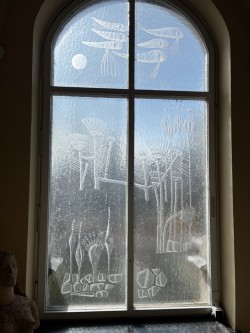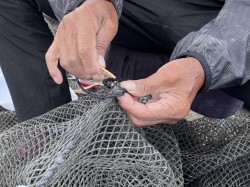The Sturgeon’s Dream/ Center for Humans and Nature

Libretto by Isaac Yuen and I has been chosen by the wonderful people at The Center of Humans and Nature. It is running it in two parts.
Sink into deep time. Sink into the sea. Sink to 210 million years ago, when the first sturgeons appeared. Sounds and noises from weather, rocks, beasts. The continent shifts. The Baltic Sea did not yet exist; Pangea the supercontinent remains whole. A rich and dense forest grows where now the Baltic Sea is, its trees turning eventually into amber, light, luminous.
FIRST SONG: DEEP TIME UNFOLDS
Under the first sturgeon moon
the one sea shudders
a cosmic sigh, this night alone
to welcome
jewel-studded fish
who came to exist
not on this day, night, or month
that year, decade, or millennia, not
out of the blue
but in the presence of that zeal for life—
has become
and now is and
will be
until one future day, in one singular moment
will not. Cease to exist. Vanish. Forever
Foam on the sea.
A wave of moonlight penetrates the surface
refracts
slows
changes course, rebounds,
sparks from jittering photons
from sun reflected via moon to earth
to land on silver sturgeon skin.
If us, we,
had been around then
and addressed a letter to Purkyně, Europe,
Purkyně would write back and explain
that even then
if our eyes had been
there and then
to witness—
the light would have indeed
turned silver,
the moonlight shed
on an ancient sea.
Who is to say what
we would have seen then
would move us now,
us seeing so much
that we forget
to look
and thus see nothing?
A sturgeon’s vision relies on
four barbels dangling near the mouth
to sense other lives, electric pulses, signals, present, vital.
From sea to barbel to sturgeon body, like moonlight hushed into the depth,
currents translating other presences
into a world, an Umwelt of its own.
Electrified by entities
the ocean pulses too, with every molecule:
Organic matter, fluid matter, drifting matter, sinking matter
rising matter, floating matter.
Creatures and critters, multicellular organisms, singular cells
roiling with life.
And on shore, the one shore, the only shore
the same sturgeon moon
Rises also
above that mass of land, above the continent that is
where the first gingko tree
just then
unfurls its branches, casts its shadow
on who is to say?
created as part of the Aland Universe project by Frauvonda
What if?/ Lecture on Speculative Fiction

What if? Is such a powerful question and one that drives speculative fiction. How can this literary genre serve as a methodology to help us understand the complex questions we are entangled in? How can it change our approach to the more than human world? Lecture at Connected Classe by invitation of Public Art Lab, Bauhaus University Weimar and Nanyang University, Singapore. Illustration by Auntlantis.
Towards an interconnectedness of science and senses/ Intensive writing course at UdK

To become another. Been teaching all week an intensive course on Nature Writing - towards transformation and interconnectedness at UdK. We looked at the survival strategies of viruses, bacteria, mushrooms, genetic modification and poisons. We visited the Robert Koch Institute, spend some time at the National Gallery listening to paintings and discussed silk punk, science writing, sci-fi, speculative fiction, creative non-fiction with texts by Karen Russell, Octavia Butler, Benjamin Labatout, Merlin Sheldrake and Natassja Martin. Our lives are so entangled. Loved working things out with the students, loved to listen to their ideas, loved to spend 5 days or 35 hours together exploring.
Fishing in Japan/ Deutschlandfunk Kultur Weltzeit

While researching bodies of water in Japan, I got side-tracked by all the stories I would gather from talking to fishermen and women. A strange pattern appeared. A new, old way of living off the sea in different ports between Hokkaido and Kyushu. Sometimes so humble, it made my heart ache. My radio piece about the new fishing culture in the land of sushi is now out on German national radio. Weltzeit. Deutschlandfunk Kultur. and is available in the archives for a year. There are some truly silly ideas, like the giant squid statue, there is denial, loss, blaming others, but mostly I saw appreciation and respect for the marine species that become food. There is also a sense of urgency that runs as an undercurrent through every encounter. Listen to the piece here.